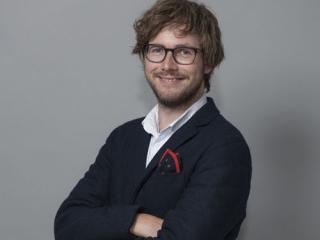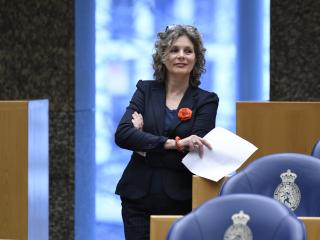"What do you think, spring flower?"
Corrie Hennekam (1929, née Turlings) from Limburg came to Tilburg to study when she was 18 years old. It was 1947; the Netherlands was in a phase of reconstruction just after the end of the Second World War. Corrie’s general development, for example in the field of politics, had come to a complete halt during the war.
Corrie: “In the middle of October 1944, all the inhabitants of the village where I lived had to evacuate because the Ardennes Counteroffensive was expected to come right through our village and the houses had been commandeered by the Germans. We left with a handcart, blankets, and some clothes. After walking for about 15 kilometers, we came to a monastery. We stayed in the cellars with hundreds of people. There was nothing, little food, no toilet paper. With my three sisters, I slept in an apple cellar on bare wooden crates. It was very dirty and unhygienic. The monastery was constantly under attack. In the morning, we had to go outside to get food and milk from the neighboring farms. Healthy people were fed mashed potato peelings; the weaker people were given mashed potatoes. It really was a dramatic situation.”
This situation ended with the arrival of the British at the end of January 1945.
Poverty-stricken to Tilburg
After the war, her parents had almost nothing left, but they did everything they could to allow their daughter to study. “So I was as poor as a church mouse when I came to Tilburg. When I arrived at the train station, I didn't even know how to take a bus to my digs. Also, I had no idea how a library worked. Luckily, I'm a go-getter. I regularly worked with Aunt Steijn in the mensa because this meant you could eat for free so I had some money for fun things. I have strung tons of beans.”
I had a good time in the city as a board member of the girls' association Atoom. Even though I didn't have two pennies to rub together, I participated in everything.
Photo: Corrie Turlings with her boyfriend
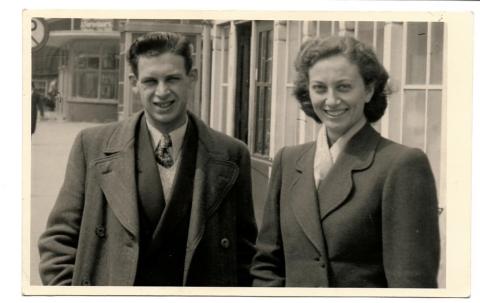
I always stood out
When Corrie Hennekam-Turlings started her studies, she was one of the few female students. “In total, the college had around 500 students.” Of the four girls with whom she started in 1947, three never went to lectures. “I remember that one had to earn her living as a nanny and therefore had no time to attend lectures. I was always on my own, and that made me stand out even more. I always felt like I had to be on my guard. I found that difficult.” Fortunately, the contact with fellow male students was pleasant. “We were on friendly terms and I met my first husband during my studies.”
I always felt like I had to be on my guard. I found that difficult.
Verberne called me to order
The professors did not make it easy for her. She recounts stories about those times with relish. “I remember Professor Verberne, who taught Law, once called me to order. At that time, we had to stand up when the professor came in and we were only allowed to sit down when the lecture started; all this in complete silence. This lecture was so boring that I said something to my neighbor and Verberne asked me: ‘What do you think, spring flower?’ Well, spring flower didn't think anything at all because she wasn't paying attention and turned as red as a beet.” Professor Weve thought she should not study with the boys. He did not feel that was appropriate. “So he made me review the study material. He asked questions, I answered them, and in this way I mastered the material. And Professor Cobbenhagen didn't think much of girls studying economics. A college friend and my later husband helped me prepare for an exam. I can still see them walking around, with their hands on their backs, firing questions at me. They emphasized that I had to do very well because Cobbenhagen would be tougher with me than with male students. Fortunately, the exam went very well.” After four years, she was more than fed up with the negative attention and left the university after obtaining her kandidaats degree. “I really didn't feel like continuing studying.”
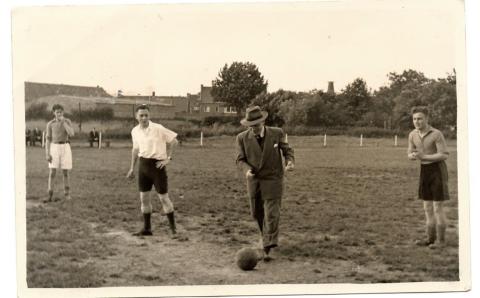
Photo: Statistics professor Dalmulder kicks off during a football match
Professor Weve
She had a special relationship with Professor Weve. “He took care of me from the very beginning of my studies. I really thought he was a cutie. He lived in a small house near the Cenakel in Tilburg. The nuns took care of him. When I came to study with him, a small table had been placed next to the chair where I was to sit, with a teapot on it, covered with a small tea cosy.”
There was no interaction. The professor gave a lecture; we made notes and had to find out the rest for ourselves.
The lectures
At that time, lectures were very different compared to now. “There was no interaction. The professor gave a lecture; we made notes and had to find out the rest for ourselves.” Multiple-choice exams did not exist yet. Students took exams orally. “We received a call for an exam by postcard. Look, I saved one. It says: ‘I look forward to receiving you for the exam on Saturday at 17:30hrs.’ Funny, isn't it?”
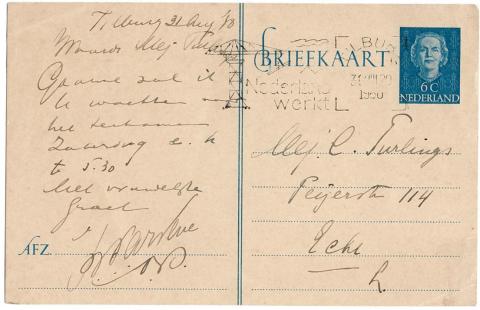
And professors administered exams at home or at work. “For example, I once took a law exam in the parliament buildings in The Hague. This was with Professor De Blok, who then worked at the Ministry of Finance. I can still see myself taking the train in my suit, I remember the soft plush sofa on which I sat, and the delicious coffee served by a footman.”

The study program was not specialist
Both the Economics and Sociology programs were broad and focused on general development. “I didn't learn about economics in detail. However, I gained insight and judgment, which have been of great use to me in practice, in my work, but also as a board member of, for example, a housing association and in the running of a girls' school. I also supported my first and second husbands, who were both entrepreneurs in the shoe industry.” All in all, she looks back on her student days in Tilburg with a positive feeling. “I had a good time in the city, for example as a board member of the girls' association Atoom. Even though I didn't have two pennies to rub together, I participated in everything.”
Corrie Hennekam died in June 2018. Her memories of her time at the university were still very vivid until the very end.
Photos: family Hennekam-Turlings
Also in Tilburg University Magazine
Date of publication: 28 August 2019


